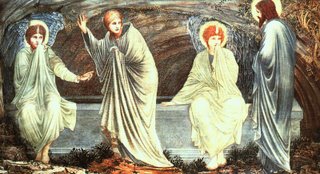Et Resurrexit: Prolegomena

Easter Sunday was disappointing for me. Though my church sang some songs that mentioned an empty tomb and the "aliveness" of Jesus, there was an extreme lack of emphasis on the resurrection itself. Indeed, the sermon was not on the resurrection, but rather was an evangelistic message (since, naturally more people come to church on Easter Sunday, pastors want to take advantage of this "ripe" situation). Ironically, it was an evangelistic message that did not include the resurrection at all. I say ironically, since when you penetrate into the earliest Christian Kerygma (proclamation) it is saturated with the resurrection.
The few times my pastor did mention the resurrection it was with a typical apologetic thrust, "if you visit the tombs of all the other great religious figures, you won't find their bodies, but if you visit Jesus' tomb his body isn't there." Moreover, the resurrection's theological significance did not go any further than, "Jesus was raised so that you forgiveness could be ensured." Sometimes I think Christians affirm the resurrection simply so that they can sing songs that emphasize Jesus living within their hearts. (On this see further Michael Bird's delightful post on the resurrection)
Now this isn't just a problem with my church. Whenever I meet a fellow believer I almost always ask them about the resurrection and what it means for them. Their understanding rarely goes beyond the two meanings I just gave above. This is disheartening to me. At the ETS meeting in Atlanta a few years back I remember NT Wright commenting about how the resurrection is viewed within America as simply "God's last big magic trick to ensure that Jesus will live forever." This is indeed how many believers treat the resurrection, as simply the last super miracle that God does. They never go further and ask, "what does the resurrection mean?"
Unfortunately, many of our Christian philosophers and theologians have not mitigated this situation. Though I appreciate much of the apologetic work that philosophers like William Lane Craig, Gary Habermas, and others have done on the resurrection they fail to deliever what the implications for Jesus' resurrection would entail. Their main intention is, quite naturally, apologetic. However, in my opinion this is a narrow view of the resurrection. And though the theologians more often ask about the resurrection's significance, this usually does not journey beyond the resurrection as a pointer to Jesus' divinity. Furthermore, as Richard Gaffin and others have pointed out, the resurrection has been significantly downplayed in soteriology, often taking a back seat to theories on the atonement thus making the death the definitive moment in salvation history.
And so for the next series of posts I'm going to discuss briefly what the resurrection meant for the earliest believers and what it means for us today. This series will have three parts which will explore the resurrection's initial, theological, and practical implications. I obviously cannot hope to exhaustively cover the meaning of the resurrection in a series of blog posts. Nevertheless, I hope to provide a least a proper overview of what I understand the resurrection to signify. No doubt some of you will have additional insights on the resurrection and so I would greatly appreciate any feedback and/or criticisms you can supply.


This should be an interesting series, Chris. I look forward to it.
Posted by Loren Rosson III |
11:42 AM
Loren Rosson III |
11:42 AM
Well said Chris. I look forward to reading what you have to say.
Posted by Michael F. Bird |
6:11 PM
Michael F. Bird |
6:11 PM